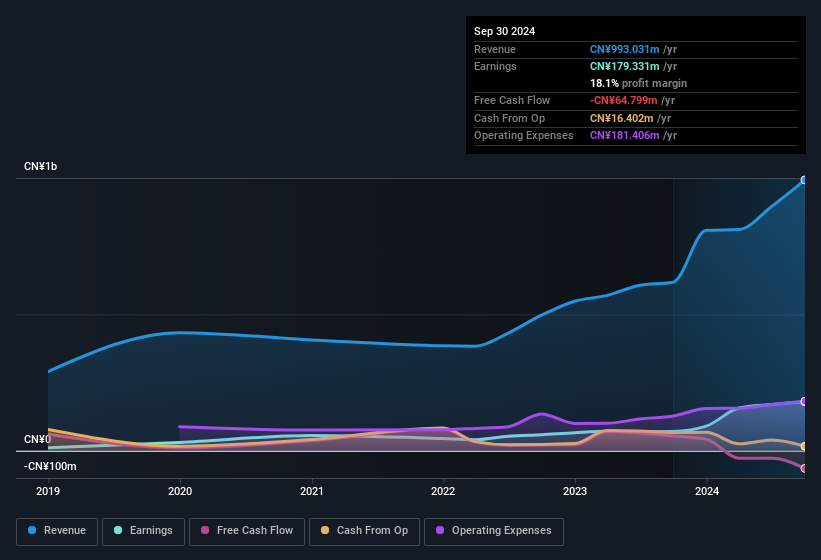- China
- /
- Commercial Services
- /
- SHSE:688480
Additional Considerations Required While Assessing Science Environmental Protection's (SHSE:688480) Strong Earnings

Last week's profit announcement from Science Environmental Protection Co., Ltd. (SHSE:688480) was underwhelming for investors, despite headline numbers being robust. We think that the market might be paying attention to some underlying factors that they find to be concerning.
Check out our latest analysis for Science Environmental Protection

Examining Cashflow Against Science Environmental Protection's Earnings
As finance nerds would already know, the accrual ratio from cashflow is a key measure for assessing how well a company's free cash flow (FCF) matches its profit. To get the accrual ratio we first subtract FCF from profit for a period, and then divide that number by the average operating assets for the period. This ratio tells us how much of a company's profit is not backed by free cashflow.
Therefore, it's actually considered a good thing when a company has a negative accrual ratio, but a bad thing if its accrual ratio is positive. That is not intended to imply we should worry about a positive accrual ratio, but it's worth noting where the accrual ratio is rather high. Notably, there is some academic evidence that suggests that a high accrual ratio is a bad sign for near-term profits, generally speaking.
Over the twelve months to September 2024, Science Environmental Protection recorded an accrual ratio of 0.40. As a general rule, that bodes poorly for future profitability. And indeed, during the period the company didn't produce any free cash flow whatsoever. Over the last year it actually had negative free cash flow of CN¥65m, in contrast to the aforementioned profit of CN¥179.3m. It's worth noting that Science Environmental Protection generated positive FCF of CN¥54m a year ago, so at least they've done it in the past.
That might leave you wondering what analysts are forecasting in terms of future profitability. Luckily, you can click here to see an interactive graph depicting future profitability, based on their estimates.
Our Take On Science Environmental Protection's Profit Performance
As we have made quite clear, we're a bit worried that Science Environmental Protection didn't back up the last year's profit with free cashflow. For this reason, we think that Science Environmental Protection's statutory profits may be a bad guide to its underlying earnings power, and might give investors an overly positive impression of the company. But on the bright side, its earnings per share have grown at an extremely impressive rate over the last three years. Of course, we've only just scratched the surface when it comes to analysing its earnings; one could also consider margins, forecast growth, and return on investment, among other factors. If you'd like to know more about Science Environmental Protection as a business, it's important to be aware of any risks it's facing. For instance, we've identified 2 warning signs for Science Environmental Protection (1 is a bit unpleasant) you should be familiar with.
This note has only looked at a single factor that sheds light on the nature of Science Environmental Protection's profit. But there are plenty of other ways to inform your opinion of a company. For example, many people consider a high return on equity as an indication of favorable business economics, while others like to 'follow the money' and search out stocks that insiders are buying. So you may wish to see this free collection of companies boasting high return on equity, or this list of stocks with high insider ownership.
New: Manage All Your Stock Portfolios in One Place
We've created the ultimate portfolio companion for stock investors, and it's free.
• Connect an unlimited number of Portfolios and see your total in one currency
• Be alerted to new Warning Signs or Risks via email or mobile
• Track the Fair Value of your stocks
Have feedback on this article? Concerned about the content? Get in touch with us directly. Alternatively, email editorial-team (at) simplywallst.com.
This article by Simply Wall St is general in nature. We provide commentary based on historical data and analyst forecasts only using an unbiased methodology and our articles are not intended to be financial advice. It does not constitute a recommendation to buy or sell any stock, and does not take account of your objectives, or your financial situation. We aim to bring you long-term focused analysis driven by fundamental data. Note that our analysis may not factor in the latest price-sensitive company announcements or qualitative material. Simply Wall St has no position in any stocks mentioned.
About SHSE:688480
Science Environmental Protection
Science Environmental Protection Co., Ltd.
Flawless balance sheet with high growth potential.
Market Insights
Community Narratives



